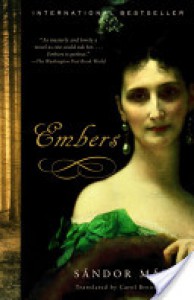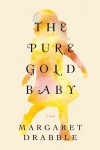Musings of a Bibliomaniac
Goodreads immigrant. Another victim of corporate tyranny. I blog at Musings of a Bibliomaniac along with my co-blogger Scarlet.
 Embers is a tale of heart-breaking beauty. The kind of beauty which is not apparent right at the onset but which makes its omnipresence felt as you keep turning the pages and reach that state of involvement with the narrative, where you cannot wait to feast your eyes and senses on another delicately structured sentence.
Embers is a tale of heart-breaking beauty. The kind of beauty which is not apparent right at the onset but which makes its omnipresence felt as you keep turning the pages and reach that state of involvement with the narrative, where you cannot wait to feast your eyes and senses on another delicately structured sentence. It lies in the pall of gloom cast by the shadow of some tragedy unspoken of, lurking in the dark, cobwebbed nooks and corners of a secluded castle, the relentless flow of time the sense of which the book tries to capture quite successfully and in the hollowness of life itself.
There is no worthwhile story to be found at its core since a reflection on love, betrayal and the consequences of human folly is nothing new. But it is the handling of these themes which is.
Sándor Márai has a way of creating a mood consistent with the dreariness of the story within and it is this mood which metamorphoses into an important character itself. Like an invisible, guiding force, this mood becomes the reader's constant companion as he/she slowly navigates his/her way around the imperfect lives of Márai's characters.
He ends up imparting a restrained elegance even to the meanest of human tendencies like the insane urge to kill another and to the chilling finality in a man's feelings of disillusionment with life and the people he held dear to his heart.
It is as if Márai's aim from the beginning had been not to bestow significance on numerous life events of a handful of people but instead on an acute analysis of human actions and how individual acts of indiscretion feature in the greater scheme of things. How eventually everything dies out and ceases to matter, after creating a few evanescent ripples on the surface of the placid lake of human existence.
A few irritants have kept me from placing this book on my personal, metaphysical pedestal of absolute literary perfection - the objectification of women, a subtle nod of approval to medieval values like the appreciation of gender specific character traits, the seemingly endless and tedious monologue in the latter half of the book and a sense of perverse vanity the central characters seem to derive out of their European ancestry caused me to take away that 1 star.
Barring these minor causes of botheration, Embers is near perfect. It glows powerfully with the spirit of all actions and emotions so distinctly characteristic of life itself, before burning out and surrendering itself to the inevitability of an ending.









